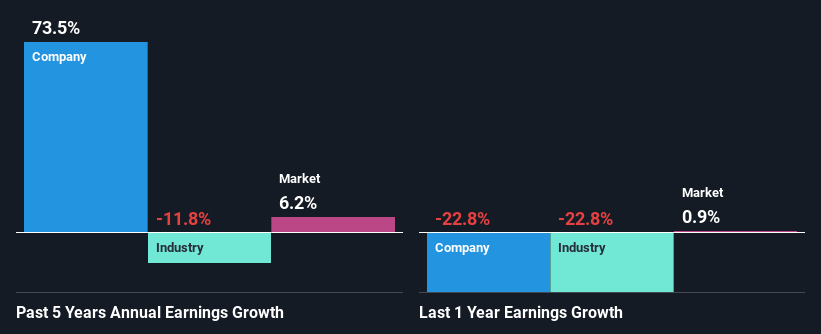- Hong Kong
- /
- Interactive Media and Services
- /
- SEHK:1357
Is Weakness In Meitu, Inc. (HKG:1357) Stock A Sign That The Market Could be Wrong Given Its Strong Financial Prospects?

With its stock down 12% over the past three months, it is easy to disregard Meitu (HKG:1357). However, a closer look at its sound financials might cause you to think again. Given that fundamentals usually drive long-term market outcomes, the company is worth looking at. Particularly, we will be paying attention to Meitu's ROE today.
Return on equity or ROE is an important factor to be considered by a shareholder because it tells them how effectively their capital is being reinvested. In other words, it is a profitability ratio which measures the rate of return on the capital provided by the company's shareholders.
View our latest analysis for Meitu
How Do You Calculate Return On Equity?
ROE can be calculated by using the formula:
Return on Equity = Net Profit (from continuing operations) ÷ Shareholders' Equity
So, based on the above formula, the ROE for Meitu is:
10% = CN¥461m ÷ CN¥4.5b (Based on the trailing twelve months to June 2024).
The 'return' is the amount earned after tax over the last twelve months. Another way to think of that is that for every HK$1 worth of equity, the company was able to earn HK$0.10 in profit.
What Has ROE Got To Do With Earnings Growth?
Thus far, we have learned that ROE measures how efficiently a company is generating its profits. Based on how much of its profits the company chooses to reinvest or "retain", we are then able to evaluate a company's future ability to generate profits. Generally speaking, other things being equal, firms with a high return on equity and profit retention, have a higher growth rate than firms that don’t share these attributes.
Meitu's Earnings Growth And 10% ROE
At first glance, Meitu seems to have a decent ROE. Further, the company's ROE compares quite favorably to the industry average of 6.8%. Probably as a result of this, Meitu was able to see an impressive net income growth of 73% over the last five years. However, there could also be other causes behind this growth. For instance, the company has a low payout ratio or is being managed efficiently.
Given that the industry shrunk its earnings at a rate of 12% over the last few years, the net income growth of the company is quite impressive.

Earnings growth is an important metric to consider when valuing a stock. The investor should try to establish if the expected growth or decline in earnings, whichever the case may be, is priced in. This then helps them determine if the stock is placed for a bright or bleak future. One good indicator of expected earnings growth is the P/E ratio which determines the price the market is willing to pay for a stock based on its earnings prospects. So, you may want to check if Meitu is trading on a high P/E or a low P/E, relative to its industry.
Is Meitu Efficiently Re-investing Its Profits?
Meitu's three-year median payout ratio to shareholders is 23%, which is quite low. This implies that the company is retaining 77% of its profits. So it looks like Meitu is reinvesting profits heavily to grow its business, which shows in its earnings growth.
Along with seeing a growth in earnings, Meitu only recently started paying dividends. Its quite possible that the company was looking to impress its shareholders.
Conclusion
On the whole, we feel that Meitu's performance has been quite good. Particularly, we like that the company is reinvesting heavily into its business, and at a high rate of return. Unsurprisingly, this has led to an impressive earnings growth. Having said that, the company's earnings growth is expected to slow down, as forecasted in the current analyst estimates. To know more about the latest analysts predictions for the company, check out this visualization of analyst forecasts for the company.
New: Manage All Your Stock Portfolios in One Place
We've created the ultimate portfolio companion for stock investors, and it's free.
• Connect an unlimited number of Portfolios and see your total in one currency
• Be alerted to new Warning Signs or Risks via email or mobile
• Track the Fair Value of your stocks
Have feedback on this article? Concerned about the content? Get in touch with us directly. Alternatively, email editorial-team (at) simplywallst.com.
This article by Simply Wall St is general in nature. We provide commentary based on historical data and analyst forecasts only using an unbiased methodology and our articles are not intended to be financial advice. It does not constitute a recommendation to buy or sell any stock, and does not take account of your objectives, or your financial situation. We aim to bring you long-term focused analysis driven by fundamental data. Note that our analysis may not factor in the latest price-sensitive company announcements or qualitative material. Simply Wall St has no position in any stocks mentioned.
About SEHK:1357
Meitu
An investment holding company, develops products that streamline the production of image, video, and design to advance industry digitalization through beauty-related solutions in the People’s Republic of China and internationally.
High growth potential with excellent balance sheet.

